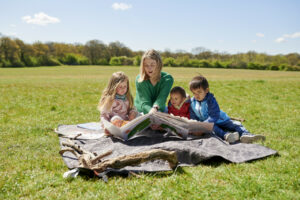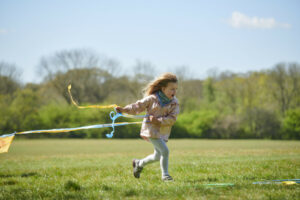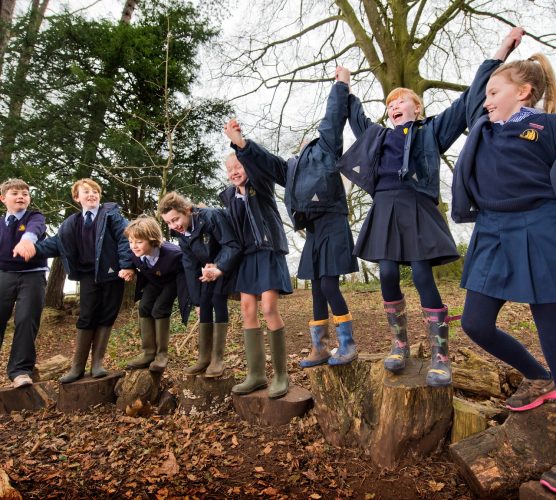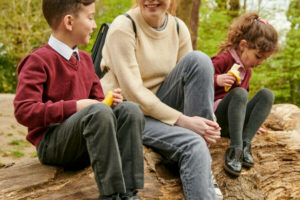An article in The Guardian suggests that three quarters of UK children spend less time outside than prison inmates. This alarming statistic could be related to a number of issues, including the rise of tech and screen time in our homes, the perceived risks of letting our children play independently, or the diminishing number of green spaces in cities. Mark Sears, from not-for-profit organisation The Wild Network, which seeks to ‘rewild childhood’ describes the disconnect between modern children and nature as “the biggest parenting challenge of our times.”
Benefits of being in nature
So as parents, how can we encourage our children to enjoy nature, to appreciate it and value it over other, often tech-based, activities? Firstly, we need to understand more about the benefits of being outdoors and how this can bring about positive change for our children.

Studies have shown that being outdoors has a calming effect on children, especially those prone to hyper-activity or restlessness. Spending time in nature has been proven to help mental health and ease depression. Free from the constraints of the classroom, teachers have noticed less challenging behaviour from students who might misbehave in a traditional classroom setting. Many schools have picked up on this, having seen improvements in concentration levels from outdoor learning.
Long Crendon School in Aylesbury recently transformed a disused plot of land adjacent to the school into an outdoor learning environment thanks to donations from parents and the local community. Headteacher Sue Stamp insists outdoor learning is now a way of life at the school and she not only credits this to the school’s continuing exam success, but says children who didn’t engage in the classroom ‘come into their own when they get outside’.

At all levels of primary education, forest schools are teaching kids how to play and learn in nature through mud kitchens, den building and bug hunts. The movement is strongly influenced by contemporary Scandinavian practice but also by earlier, pioneering open-air education concepts such as Margaret McMillan’s outdoor nurseries. Now it is growing quickly, driven by concerns about children’s loss of contact with nature and worries that a cotton-wool-wrapped generation no longer gets the chance to take risks.
Things to do with children
Time with nature doesn’t need to be scheduled amongst other organised activities. Sears, from The Wild Network, suggests taking a simpler approach. One easy tip for parents to help children appreciate their surroundings is to take young children to a park or woodland and ask them stop and listen to the sounds around them. Not only is this a peaceful, meditative pastime it also helps children understand what nature is made up of, especially as the sounds change throughout the seasons.
Unstructured play, without limits, can help build a child’s confidence in nature. Time outdoors doesn’t have to be educational but parents are often surprised at how interested children are in the little details if we give them the time to discover it – a family of woodlice under a log, bees buzzing around a wild meadow or even just leaves rustling in the breeze. Children can also learn how much fun being outdoors can be. With supervision, younger children can learn to be adventurous by climbing trees, foraging for food or even helping to light a fire.
Exploring nature in London

In London, there are areas of woodland almost as wild as the countryside for children to explore. Richmond Park is the biggest park in Europe and Hampstead Heath has a range of landscape from ponds to woodland to meadows. Kew Gardens offers a huge variety of botanical species and plenty of wild areas. In these spaces, children can escape the busy city streets and play in a natural environment. Even at home in our gardens, however small, we can offer an opportunity for experience. Little children love the wonder of gardening and watching seeds grow in the earth. It also helps teach them responsibility and care, through watering and tending to seedlings and gives them an insight into how the natural world works. Eating food grown from the garden is also constructive – children are often much more willing to try different vegetables if they’ve grown them themselves!
Babies and children are often drawn to mud and dirt – even putting it in their mouths to taste it. This instinctive behaviour helps build up their immune systems, but it also shows that as humans we have a predisposition to connect with the earth and it is through this impulsive behaviour children can learn to enjoy the sensations that nature provides. Children are naturally curious and inquisitive about life, so with the right guidance we can easily help shape their experience of the outdoors.
At Koru Kids, we really encourage our nannies to explore nature with children – and our home nursery service is built around our outdoor learning ethos.



